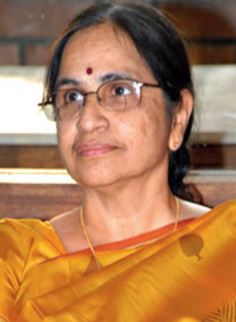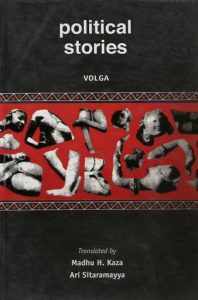
Political Stories by Volga

Political Stories-12
What is to be done? (Part – 2)
Santha would occasionally get anxious and unsettled that she wasn’t like Sobha. She was never content, never moder-ate; instead she was a want-it-all person. And how many problems she had to face because of that! How much tur-moil! Her folks would object to her participation in com-petitions, so she wouldn’t tell them about her activities. But then she would arrive home late on the competition days and get yelled at and cry. She would be outraged at her brother who always belittled the prizes she won. She would remain disturbed for a while, but couldn’t help resuming participation in the competitions. But Sobha….. she could stay away from them. Santha wondered why she wasn’t able to do that.
It wasn’t only competitions… she would go on pleasure lt s go to movies and meetings without telling anyone at tips. A couple of months ago there had been a striker at toe college and she was deeply involved in it, but Sobha staved home happily. Santha on the other hand stood at the front gate of the college and caught the attention of the lecturers. The principal called her parents. How abusive her mother was that day! How rough her father was, catching her by her hair and shaking her How much her brother ridiculed and laughed at her! She cried the whole day. Bur in all that she felt that the points raised by the students of
- C. College, particularly those of Ramkumar, were tea-sonable. She was convinced of the rationale for the strike.
But when she tried to explain that at home, she was yelled at further.
Why do I get into these problems? How peaceful it would be if I could desist from doing things forbidden by my parents? Wouldn’t it be nice to keep to a schedule and
“Hey, it’s time for the bus. You seem to be lost in some meditation!” Sobha tapped Santha’s shoulder.
“I will enter the elocution competition. Let me go sign up for it.” She got up and ran toward the English department.
“Sign up tomorrow. It is time for our bus now,” called out Sobha, but Santha was already gone. Just as she thought, their bus pulled up within seconds of Santha leaving. Sobha got into it without waiting for her.
For the next few days Santha and Soba researched together to collect all the necessary information. In fact Sobha did most of the work. The day after the competition Santha knocked on Soba’s door bright and early and entwined
her in joy: She showed her the big heavy trophy she had
won.
“Congrats! You did it!” Sobha complimented Santha and escorted her into the house and enthusiastically told her mother about Santha’s success story.
While Sobha went to the kitchen, Santha told her mother, Annapoornamma, that her daughter also would have won a prize if she had entered the competition.
“What good is staying out till late in the night and winning trophies. I don’t like that,” she replied.
Santha was disappointed. By then Sobha came from the kitchen with two cups of coffee.
Annapoornamma went to the kitchen.
Soba’s sister and brother greeted and complimented her.
“So what did your folks think about your trophy?” asked Sobha.
“My mother is worried that my brother doesn’t get trophies like this. My father, well, he is afraid he might be coming down a step from his exalted position if he compliments me. My brother, of course, is envious and resent-ful.”
“Oh, come on, parents think they shouldn’t praise children to their faces. That’s why they don’t compliment them, but I am sure they are very pleased,” said Sobha.
I wish I could reconcile it like that, thought Santha.
During the day as the lecturers, the principal and fellow students congratulated her, an obviously delighted Santha turned to her friend who had been happily tagging along and asked, “Don’t you feel bad? If you entered the competition, you would have enjoyed all this recognition.”
“Chi. Why should I feel bad? You should get a trophy for talking foolish too!”
‘ Sobha retorted.
On another occasion – it was when the students had planned on staging kanyaasulkam, Sobha told Santha and Ms. Swarajyalakshmi something she had not shared with anyone else.
Apparently her folks had heard her rehearse the dialogues of Madhuravaani, and asked her to quit the play. After Sobha explained and pleaded, her father finally relented and agreed that she could play the role of Buccamma, but not Madhuravaani. Santha was infuriated when she heard Sobha calmly explain the situation to the teacher and request the change of roles.
“Why are your folks against your playing Madhuravaan?” Santha asked, unable to hold back her disapproval.
“They are afraid her dialogues are not good. They worry that folks in the audience might later call me Madhuravaani or the students might tease me with Madhuravaani’s dia-logues. They wouldn’t like that.”
“You are the one who is going to put up with such things.
Why should they barge in?”
“They don’t want to put me in a situation like that.”
“Is it ok then if I play the role and suffer the consequences?”
Santha asked. Sobha just smiled in response.
Santha didn’t drop it there. “Look, somebody or the other has to play that role and no matter who it is, she will have to put up with the teasing by the boys.?
My parents don’t like my having to put up with such things.
They can’t accept it.”
My parents also can’t tolerate it. My brother – trust me, he will make a big deal out of it. He might even argue that 1 should be stopped from going to the college. But I don’t care, I will play Madhuravaani.”
‘Santha spoke in a determined tone.
“Go ahead, did I say you shouldn’t?”
Why don’t you stand up to your folks? How can you hold back?”
“I don’t like to. To me it looks like my parents are saying it for my own good. I don’t feel like arguing against them. I would like to listen to them and make them feel happy.” That Sobha could say that so calmly infuriated Santha.
“You can give up everything that is fun for the….
“Fun things…. that is all they are, right?” laughed Sobha.
Finally, Santha played the role of Madhuravaani. The laugh-ter, the knitting of the eye brows, the swaying of the hands that went with the character – it was Sobha who showed her how to play the role and helped her practice it to per-fection. After the play was staged, Santha was profusely complimented by one and all. The artists and literary people of the town were all there and Santha was drenched in their acclaim.
Santha felt very sorry for Sobha, but Sobha gave her a big hug and congratulated her.
Everybody was certain that Soba would be elected president of the student body in her final year of college. Infact it was thought that no one would contest against her, racking her an unanimous choice. However, differences cropped up between the B.Sc. and B.A. students; what has initially started as a conflict between a couple of students was later blown all out of proportion. The B.A. students were more in number and wanted one of their own to be come the president. The B.Sc. students backed Sobha. A contest became inevitable. B.A. girls initiated their campaign by distributing handbills throughout the college. The B.Sc. girls wanted to distribute their own handbills and time. table cards the next day. Everyone knew that the votes of the Intermediate and First Year Degree students were key for victory. Canvassing for their votes had to be done in earnest and it couldn’t be done without handbills. The responsibility for getting handbills printed was given to Santha since there was a printing press right next to her house. The B.Sc. Final Year girls chipped in and collected 500 Rupees towards the printing costs.
Santha, Sobha and Saraswathi designed the time-table cards.
That evening Santha arrived home late having had to stop by at the press on her way and got yelled at.
By eight the next morning Santha arrived at the college with a huge bundle. She and ten other girls planned on assembling there early and hand out their pamphlet as the students arrived on campus. She was, however, surprised to find Sobha waiting for her at the college gate. She said the previous day that she wouldn’t be able to come before nine thirty. But here she was.
“Thank goodness, you are finally motivated,” said a pleased Santha as she handed the bundle to Sobha.
Sobha put it down on the ground. “Santha, I can not contest in this election,” she said. Santha was dumbfounded.
Santha had a suspicion that Soba’s folks might be against her contesting the election. That was why she had asked Sobha right at the start, when she was being considered for president, whether her parents would approve of it. Sobha had said she would talk to her mother. And she had. “They agreed. I told them I wouldn’t have to do anything outside the college and they consented. They said, ‘If everybody wants you to become the president, so be it,” Sobha had reported.
It hadn’t even been a week since then. What had happened now? That too, after four or five hundred Rupees were already spent on the campaign.
“Why Sobha? What is the matter? Your folks agreed to this, right? What is it now?” Santha was in tears as she asked Sobha.
“They thought I would be elected unanimously. This contest between two candidates, printing handbills – they don’t like these things. These papers with your name on it will be strewn all over the roads. People will trample over them. If that girl Bharathi gets her campaign slogans written on the walls, your supporters will insist on writing your name on the walls, too. Who knows where that leads to? Students from the Boys’ colleges will find some excuse to get involved in this election campaign. You know how ugly that turned out two years ago. If the same thing happens again, it would be a shame. Imagine your name on everybody’s tongue in this town. How can we live with that? Do you want to get married or not?’ they asked. What can I do?
Tell me. How can I contest when they are so unhappy?» explained Sobha.
Santha felt sorry looking at the agitated face of her friend who had never been agitated before. “But what can be done nOW? A lot of students have been involved in this effort.
Almost five hundred Rupees have already been spent. What do we do about that? What will everybody say? Santha was not only anxious, but also worried about her friend Sobha, who, for the first time, skipped classes that morning.
*****
(To be Continued-)

ఓల్గా గా ప్రసిద్ధి పొందిన పోపూరి లలిత కుమారి ప్రముఖ తెలుగు రచయిత్రి. ఆంధ్రప్రదేశ్లోని రాజకీయ, సాహిత్యరంగపు చర్చలో స్త్రీవాద ధృక్పధాన్ని ప్రవేశపెట్టిన రచయితగా ఈమెను గుర్తిస్తారు స్త్రీవాద ఉద్యమానికి ప్రతీకగా నిలిచిన ఓల్గా, తనను తాను తెలుగులో గురజాడ అప్పారావు వ్రాసిన కన్యాశుల్కంతో ప్రారంభమైన అభ్యుదయ రచనా పరంపరలో భాగంగా కూడా భావించింది. నవంబర్ 27, 1950లో గుంటూరు జిల్లా చుండూరు మండలం యడ్లపల్లి గ్రామములో జన్మించారు. వీరి తల్లిదండ్రులు పోపూరి వెంకటసుబ్బారావు, వెంకటసుబ్బమ్మ. ఈమె ఆంధ్ర విశ్వవిద్యాలయంలో తెలుగు సాహిత్యం ఎం.ఎ. చేసిన తర్వాత తెనాలిలోని వి.ఎస్.ఆర్. కళాశాలలో తెలుగు అధ్యాపకురాలిగా పనిచేశారు. ఓల్గా కథలు, నవలలు, పద్యాలు మహిళా సాహిత్యములో ఎన్నదగినవి. చలం, కొడవటిగంటి కుటుంబరావు రచనల వల్ల ప్రభావితమై స్త్రీ చైతన్యము అంశముగా రచనలు చేసి తనకై ఒక ప్రత్యేక స్థానము సంపాదించింది. పత్రికలలో, సాహిత్యములో, అనువాదములలో మహిళా హక్కులపై వివాదాస్పద చర్చలు గావించింది. చలన చిత్ర రంగములో ‘ఉషా కిరణ్’ సంస్థకు కథా రచయిత్రిగా పనిచేసి మూడు చిత్రాలు నిర్మించి పురస్కారాలు పొందింది. ఈమె రాసిన స్వేచ్ఛ నవలని వివిధ భారతీయ భాషల్లోకి అనువదించడానికి నేషనల్ బుక్ ట్రస్టు స్వీకరించింది.1986 నుండి 1995 వరకు ఆమె ఉషా కిరణ్ మూవీస్ లో సీనియర్ కార్యవర్గ సభ్యురాలిగా పనిచేసారు. 1991 నుండి 1997 వరకు అస్మిత రిసోర్స్ సెంటర్ ఫర్ విమెన్ కు అధ్యక్షురాలిగా పనిచేసారు. ఆమె ప్రస్తుతం అస్మితలో జనరల్ సెక్రటరీగా పనిచేస్తున్నారు.
